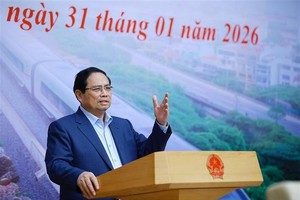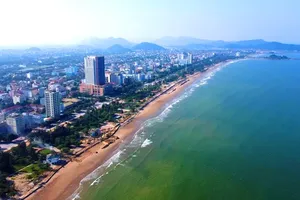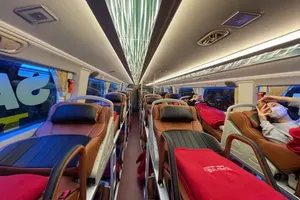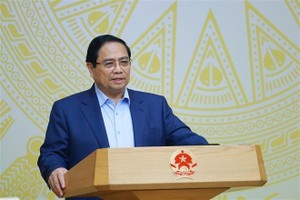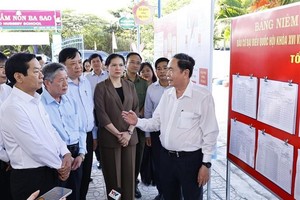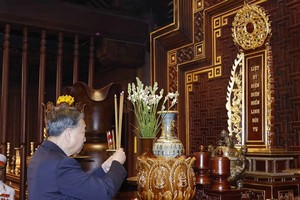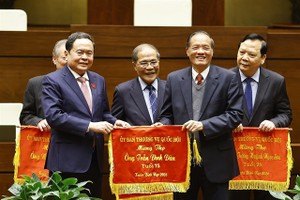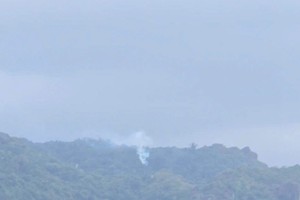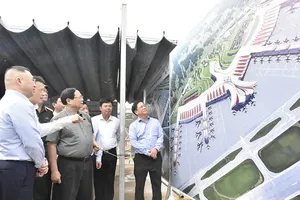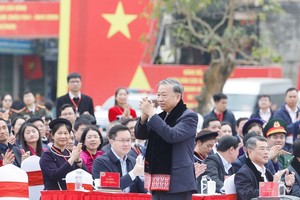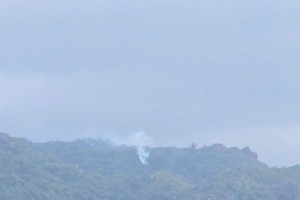Despite these hardships, day after day, border guards and teachers persist, diligently nurturing knowledge and illuminating the future of the islanders' children.
"Sowing knowledge" on Hon Chuoi Island
During their voyage, the HCMC delegation visited Hon Chuoi Island in Song Doc Town, Tran Van Thoi District, Ca Mau Province. The island hosts a self-managed community group of 39 households with 128 residents, situated 20 nautical miles from the mainland.
Upon arriving, the first striking image is of makeshift houses clinging to the mountainside, their fronts facing the vast ocean. Amid the lush green of the surrounding forest and endless blue of the sea, students in white uniforms and red scarves can be seen making their way to class.
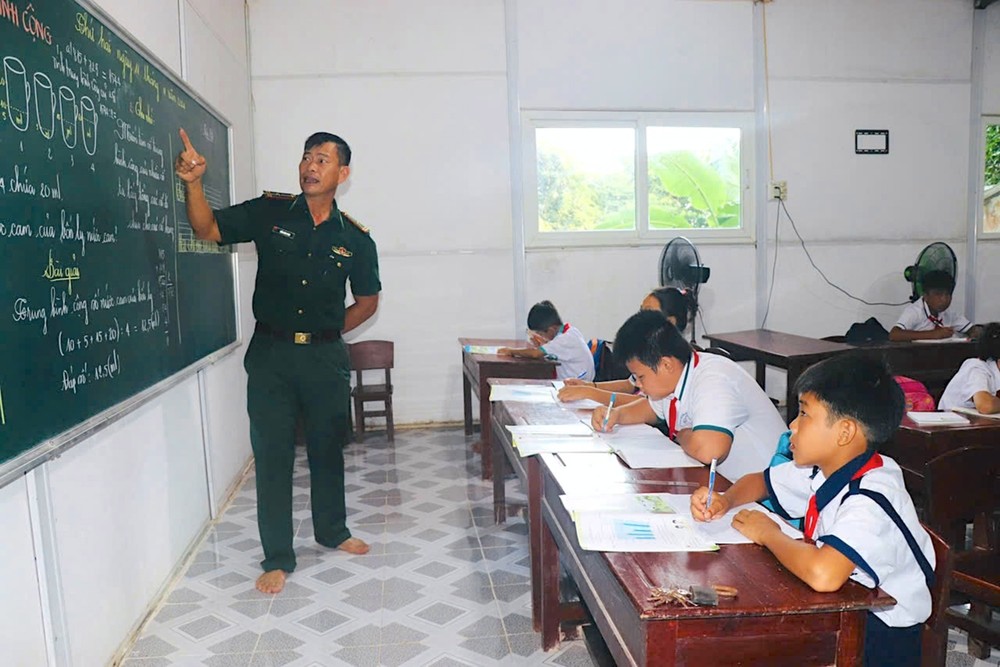
To attend school, the children climb 375 steep steps to the island's peak, where a charity class has operated since 1995, the year settlers first arrived on the island. This class was established by officers and soldiers from the Hon Chuoi Border Guard Station. Though the class was occasionally interrupted due to officer reassignments and challenges in finding replacements to teach, it has run continuously for over 15 years since Major Tran Binh Phuc was stationed on the island.
Major Tran Binh Phuc’s class is held in a small 30-square-meter room with three boards displaying different lessons. Initially, the class had 22 to 30 students, but by 2024, only 12 remained, as many moved to the mainland for further education. The class is divided into five groups, and Major Phuc rotates between them, teaching students of various ages and levels.
Recalling his early days, Major Phuc shared, "I felt struggled at first, balancing my duties with lesson planning and teaching. The children here had limited exposure to the outside world, and at times, I wanted to give up. But over time, I found my way and now look forward to every day in class, driven by a love for these children."
He expressed his gratitude, noting that the support of the Party Committee of the Ca Mau Border Guard and the unit's leadership had ensured all the necessary conditions to maintain the class. He added that assistance from local authorities, including the Party Committee, government, and people of HCMC, had improved the teaching and learning facilities.
Taking the youngest children down to the base of the island and then returning to help the older ones, the green uniform of the border soldier was soaked through. Major Tran Binh Phuc said that the sudden rain had made the stairs slippery and dangerous for the children. "It takes a little effort, but the children will be safe," he added. "Soon, a young soldier will join me to help teach the children. No matter how difficult it gets, we will not give up."
Tho Chau is home
Thirty-two years ago, young soldier Bui Anh Dung went to the Tho Chu Archipelago (Kien Giang Province) to take on a mission at Radar Station 610, Regiment 551, Naval Region 5. The journey took him over 2,000 kilometers from his hometown of Vinh Bao, Hai Phong. At the time, Dung was 20 years old, filled with youthful energy and a strong desire to serve.
"At that time, the island was sparsely populated, mostly by soldiers. When I first arrived, there were moments when I missed home so much that I couldn’t hold back the tears," recalled Lieutenant Colonel Bui Anh Dung, an officer at Radar Station 610.
In 1993, the first settlers from the mainland arrived on the island as Kien Giang Province sent 17 households to Tho Chu (Tho Chau) Island to help develop the local economy and strengthen national defense. That same year, Tho Chau Island (part of the Tho Chu Archipelago) was established as a commune under Phu Quoc District (now part of Phu Quoc City). With the arrival of residents and children, the island became "warmer" and more vibrant.
For Dung, the deep longing for his family led him to express his plan in 1994 to bring his wife, Ha Thi Oanh, and children to settle on the island. While Oanh was uncertain about life on Tho Chu, Dung assured her, "We’ll farm, raise livestock, and do whatever needs to be done." She agreed, and their family joined the five other soldier families at Radar Station 610.
As more children arrived, a 30-square-meter classroom was built to accommodate around 20 students of various ages. A teacher from the mainland came to teach all grade levels.
Oanh helped with the younger children, later training as a teacher and eventually becoming the vice principal of Tho Chau Primary and Secondary School, established in 1996.
Following her husband, a soldier, young teacher Nguyen Thi Ngoc Huyen (wife of Lieutenant Cao Xuan Tuan) moved to Tho Chau Island in early 2022 and now works at Tho Chau Kindergarten.
After nearly three years on the island, she shared, "I got pregnant soon after arriving and gave birth to a healthy baby boy. Raising a child here made me understand the challenges children face, which made me love them even more."
Huyen expressed hope for the school, saying, "While the school’s facilities have improved, the lighting system is still lacking. We use a generator in the morning, but in the afternoon, we must conserve power. I hope the school will have a solar power system so the children can sleep comfortably in class during the afternoon, and teachers and students won’t have to teach and study under the trees or in the school corridors."
Tho Chau now has over 400 students from kindergarten to secondary school. When they reach high school, students are sent back to the mainland to continue their education. The number of households on the island has grown 30-fold compared to over 30 years ago, with more than 500 families and nearly 2,000 residents. Most engage in aquaculture, fishing, and related services.
Oanh, Huyen, and many other teachers on the island share the same belief: "Tho Chau is now home—a place of warmth and a foundation for growth and development."
Although the journey to the Southwestern islands and the DK1/10 platform was brief, it allowed the HCMC delegation to better understand the lives and silent sacrifices of the soldiers and civilians during peacetime.
Deputy Secretary Nguyen Phuoc Loc of the HCMC Party Committee remarked that in recent years, HCMC has launched several initiatives such as "For the Beloved Sea and Islands, For the Frontline of the Fatherland," "Lighting Up the DK1/10 Platform Together," "Lighting the Sea Lamps with Fishermen," and "Contributing Stones to Build Truong Sa."
These programs, initiated by the Party, government, and people of HCMC, aim to provide the best conditions for soldiers, officials, and civilians on the islands and platforms to fulfill their duties in safeguarding the nation's sacred sea and island sovereignty. HCMC continues to act with the spirit of the beloved city named after Uncle Ho—a city of compassion, a city with the country and for the country.

